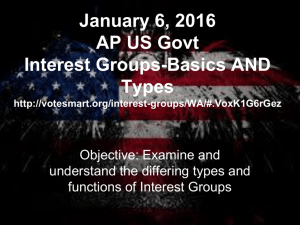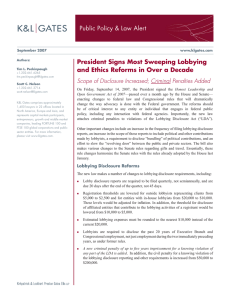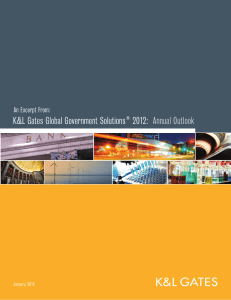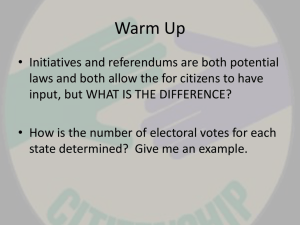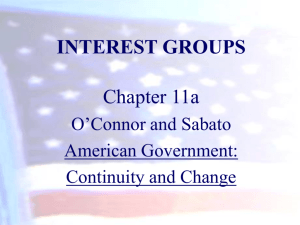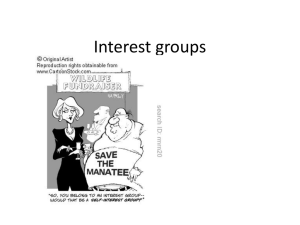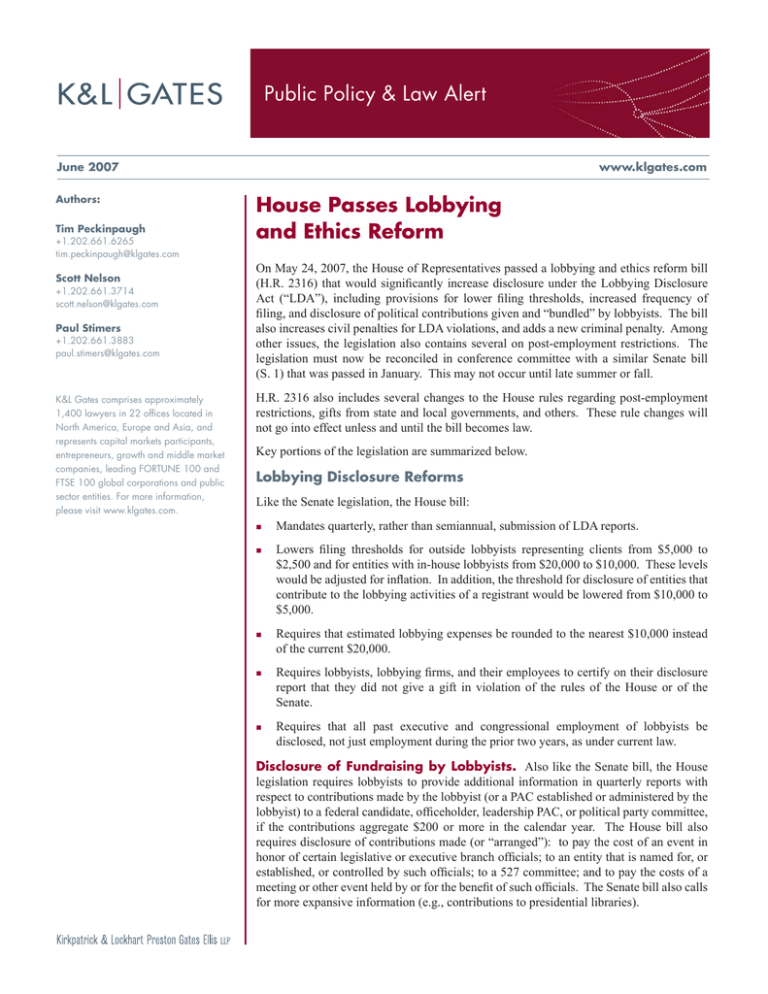
Public Policy & Law Alert
June 2007
Authors:
Tim Peckinpaugh
+1.202.661.6265
tim.peckinpaugh@klgates.com
Scott Nelson
+1.202.661.3714
scott.nelson@klgates.com
Paul Stimers
+1.202.661.3883
paul.stimers@klgates.com
K&L Gates comprises approximately
1,400 lawyers in 22 offices located in
North America, Europe and Asia, and
represents capital markets participants,
entrepreneurs, growth and middle market
companies, leading FORTUNE 100 and
FTSE 100 global corporations and public
sector entities. For more information,
please visit www.klgates.com.
www.klgates.com
House Passes Lobbying
and Ethics Reform
On May 24, 2007, the House of Representatives passed a lobbying and ethics reform bill
(H.R. 2316) that would significantly increase disclosure under the Lobbying Disclosure
Act (“LDA”), including provisions for lower filing thresholds, increased frequency of
filing, and disclosure of political contributions given and “bundled” by lobbyists. The bill
also increases civil penalties for LDA violations, and adds a new criminal penalty. Among
other issues, the legislation also contains several on post-employment restrictions. The
legislation must now be reconciled in conference committee with a similar Senate bill
(S. 1) that was passed in January. This may not occur until late summer or fall.
H.R. 2316 also includes several changes to the House rules regarding post-employment
restrictions, gifts from state and local governments, and others. These rule changes will
not go into effect unless and until the bill becomes law.
Key portions of the legislation are summarized below.
Lobbying Disclosure Reforms
Like the Senate legislation, the House bill:
Mandates quarterly, rather than semiannual, submission of LDA reports.
Lowers filing thresholds for outside lobbyists representing clients from $5,000 to
$2,500 and for entities with in-house lobbyists from $20,000 to $10,000. These levels
would be adjusted for inflation. In addition, the threshold for disclosure of entities that
contribute to the lobbying activities of a registrant would be lowered from $10,000 to
$5,000.
Requires that estimated lobbying expenses be rounded to the nearest $10,000 instead
of the current $20,000.
Requires lobbyists, lobbying firms, and their employees to certify on their disclosure
report that they did not give a gift in violation of the rules of the House or of the
Senate.
Requires that all past executive and congressional employment of lobbyists be
disclosed, not just employment during the prior two years, as under current law.
Disclosure of Fundraising by Lobbyists. Also like the Senate bill, the House
legislation requires lobbyists to provide additional information in quarterly reports with
respect to contributions made by the lobbyist (or a PAC established or administered by the
lobbyist) to a federal candidate, officeholder, leadership PAC, or political party committee,
if the contributions aggregate $200 or more in the calendar year. The House bill also
requires disclosure of contributions made (or “arranged”): to pay the cost of an event in
honor of certain legislative or executive branch officials; to an entity that is named for, or
established, or controlled by such officials; to a 527 committee; and to pay the costs of a
meeting or other event held by or for the benefit of such officials. The Senate bill also calls
for more expansive information (e.g., contributions to presidential libraries).
Public Policy & Law Alert
Disclosure of Bundling Efforts. Lobbyists
must also provide quarterly information regarding
contributions they have “bundled” for candidates,
officeholders, leadership PACs, and multicandidate
PACS, and political party committees. In order to
qualify as disclosable bundled contributions, two or
more contributions must be made in an aggregate
amount over $5,000 and the contributions: 1) are
received by the lobbyist for, and forwarded by the
lobbyist to, the campaign or other committee; OR
2) will be or have been credited or attributed to the
registered lobbyist through records, designations,
recognitions or other means of tracking by the
candidate or other committee. The legislative history
clarifies that bundling occurs when there is a prearranged commitment or agreement by the lobbyist to
provide a specific amount of funds and there is some
mechanism by which the candidate may track the
contributions and attribute credit.
The Senate bill does not explicitly address “bundling,”
but it does mandate disclosure of contributions
“collected” or “arranged” by lobbyists for candidates
and other committees.
Disclosure of Earmarks Sought. The House
legislation requires disclosure of earmarks that have
been sought in the description of work done for each
client.
LDA Disclosure of Certain Coalitions. The
House bill requires disclosure of lobbying activities
by certain coalitions and associations. In the case
of a coalition or association that employs lobbyists,
the client is each of the individual members of the
coalition or association. Exceptions apply for certain
nonprofit organizations engaged in “substantial
exempt” activities.
Liability for Lobbyists Providing Nonacceptable Travel and Gifts. The House bill
makes it a substantive violation of the LDA for a
lobbyist to provide a gift or travel to a Member and
staff, if such gift or travel may not be accepted under
the rules of the House or of the Senate.
Increased and Added Penalties. The
House bill adds a criminal penalty of up to five years
imprisonment. It also increases the civil penalty for a
violation of the LDA from $50,000 to $100,000.
Post-Employment Issues
Employment Negotiations by Members
and Certain Staff. In an amendment to internal
House rules, the bill prohibits Members (and senior
staff earning more than 75% of Member pay) from
entering into any negotiation or agreement with regard
to future employment or salary until his or her successor
has been elected, unless a statement regarding such
negotiation is filed with the Ethics Committee within
three business days of the commencement of the
negotiations.
Ending the “K Street Project.” The House bill
prohibits Members of Congress and senior staff from
influencing the employment decisions or practices
of private entities on the basis of partisan political
affiliation.
The Other Side of the Revolving Door.
Congressional Members and staff who were lobbyists
prior to their congressional employment may not
make an official appearance before their former
employer or clients, on an issue relating specifically
to the employer or client, for one year.
Other Issues
Additional Restrictions on Congressional
Contractors. An attorney or law firm contracting
to provide services to a committee, Member, staff,
and other groups such as caucuses may not attempt
to influence a Member or staff on behalf of another
in connection with any matter on which the attorney
or law firm seeks official action until one year after
the end of the contract. Since the legislation does
not specifically limit this provision to government
contracts and thus may include contracts with
Members, staff, and others in individual or personal
capacities, the provision may be clarified so that it’s
triggered only by government contracts.
June 2007 | 2
Public Policy & Law Alert
House Rule Change for Travel Disclosure.
A House rule change requires the Clerk of the House to
publicly post documents related to travel, lodging, and
related expenses and certain reports on the Internet.
House Rule Change for State and Local
Governments. Under the House legislation, gifts
from state and local governments would no longer be
exempted from the House gift rule. Although this is a
change to the House rules, it would not go into effect
unless and until the legislation becomes law.
No Contact with Spouses. A House rule change
requires Members to prohibit everyone on his or her
staff from all official contact with that Member’s
spouse if such spouse is a registered lobbyist or is
employed or retained by a registered lobbyist to
influence legislation. Again, this would not go into
effect unless and until the bill becomes law.
K&L Gates comprises multiple affiliated partnerships: a limited liability partnership with the full name Kirkpatrick & Lockhart Preston Gates
Ellis LLP qualified in Delaware and maintaining offices throughout the U.S., in Berlin, and in Beijing (Kirkpatrick & Lockhart Preston Gates Ellis
LLP Beijing Representative Office); a limited liability partnership (also named Kirkpatrick & Lockhart Preston Gates Ellis LLP) incorporated in
England and maintaining our London office; a Taiwan general partnership (Kirkpatrick & Lockhart Preston Gates Ellis) which practices from
our Taipei office; and a Hong Kong general partnership (Kirkpatrick & Lockhart Preston Gates Ellis, Solicitors) which practices from our Hong
Kong office. K&L Gates maintains appropriate registrations in the jurisdictions in which its offices are located. A list of the partners in each
entity is available for inspection at any K&L Gates office.
This publication/newsletter is for informational purposes and does not contain or convey legal advice. The information herein should not be
used or relied upon in regard to any particular facts or circumstances without first consulting a lawyer.
Data Protection Act 1998—We may contact you from time to time with information on Kirkpatrick & Lockhart Preston Gates Ellis LLP seminars
and with our regular newsletters, which may be of interest to you. We will not provide your details to any third parties. Please
e-mail london@klgates.com if you would prefer not to receive this information.
©1996-2007 Kirkpatrick & Lockhart Preston Gates Ellis LLP. All Rights Reserved.
June 2007 | 3


